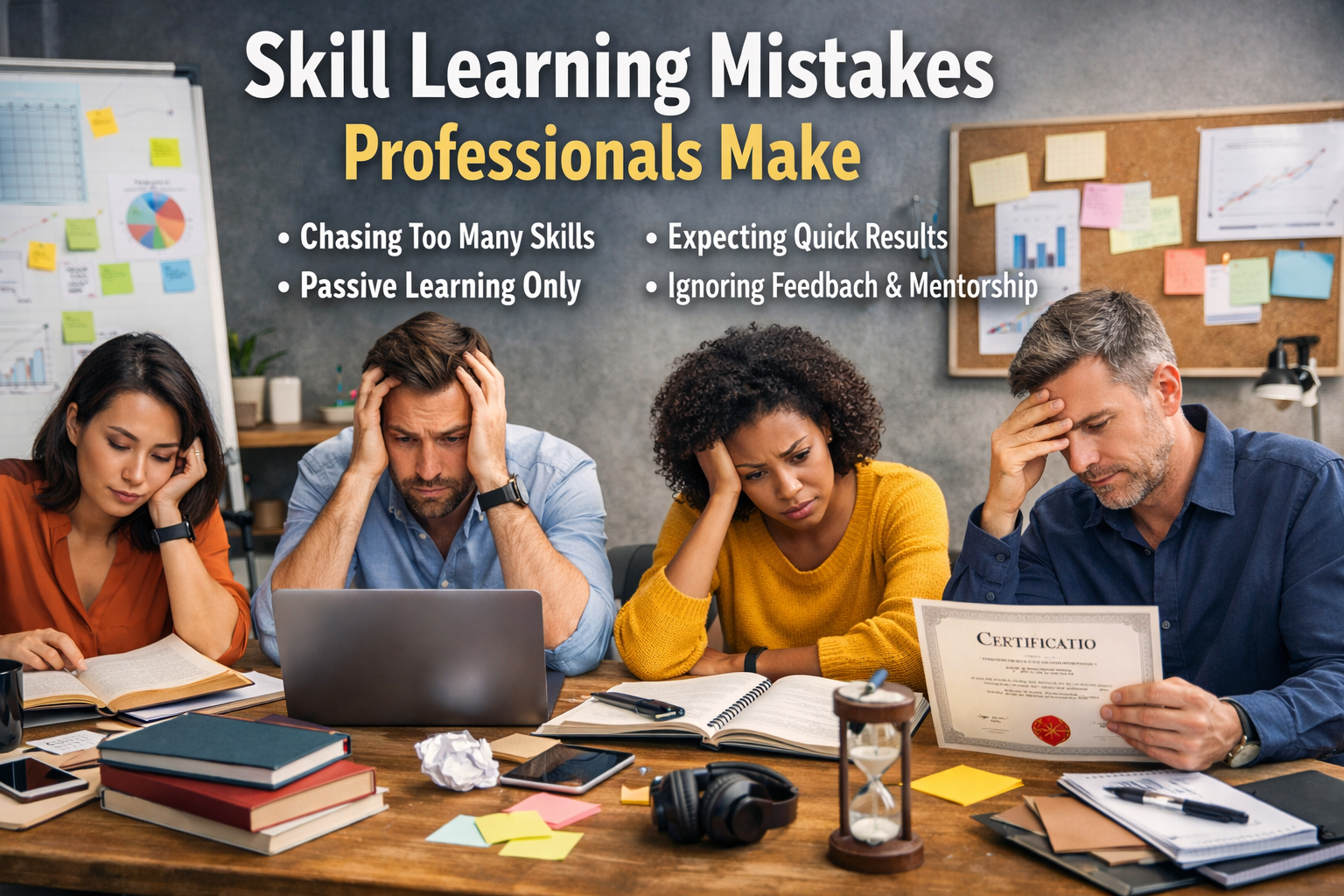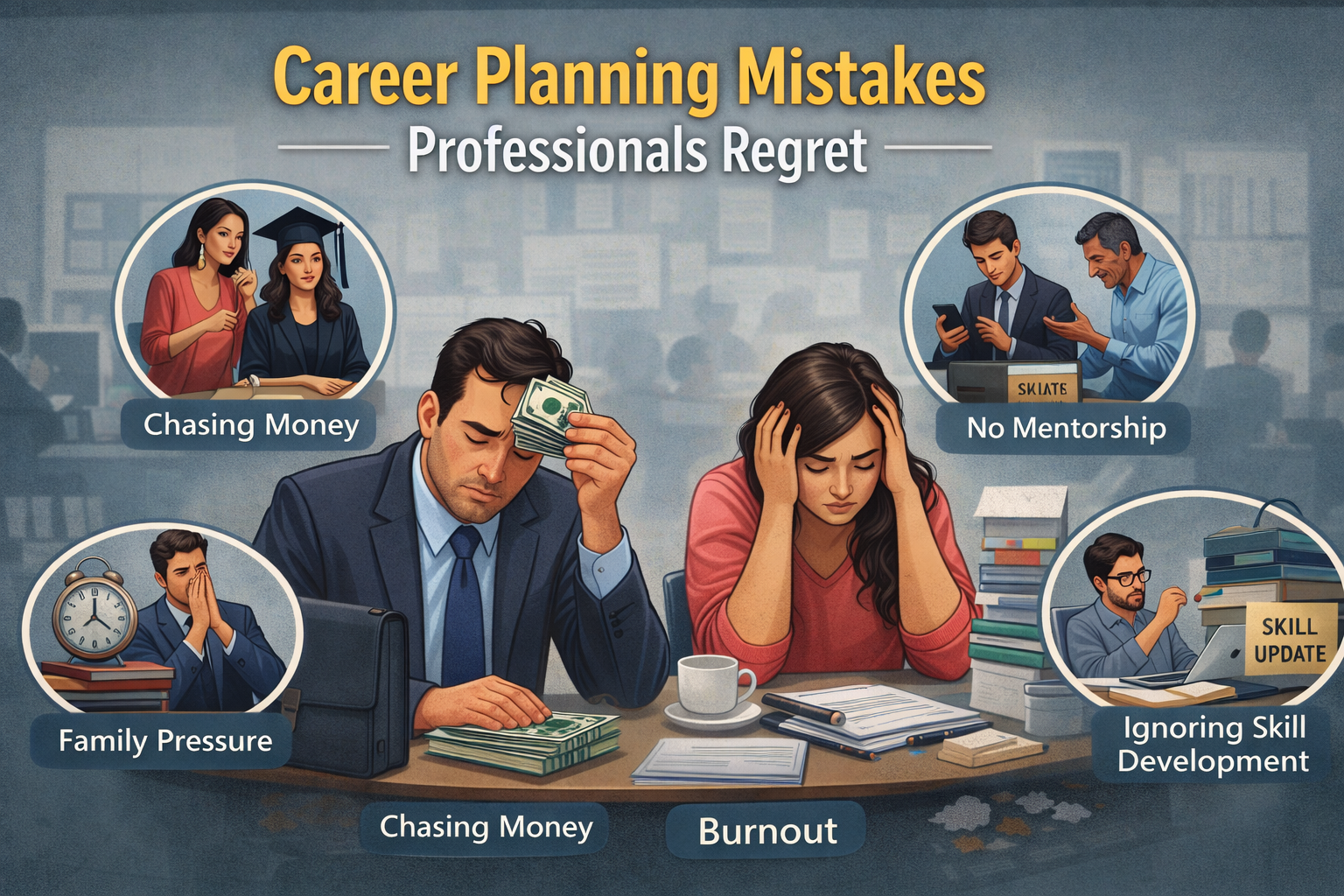Introduction
It’s true that building a career for freshers is never easy — we all know that.
If someone is successful today, it doesn’t mean they achieved everything easily. They were once a fresher too, and they also went through their own struggles — the only difference is that some people had to struggle more, while others a little less.
And if you want to reduce your struggle and build a strong career, then this article is just for you.
Read this article and help yourself grow.
Summary of the article is provided here.
1. Build the Right Skills as Freshers
In 2025, job market is changing rapidly because of the AI, automation, and remote work trend. Some skills demand are growing day by day such as;
a) Technology & Data Skills
- AI & Machine Learning Basics
- Data Analytics & Visualization
- Cybersecurity Awareness
- Cloud Computing
- Automation Tools (Zapier, Power Automate)
b) Digital Communication Skills
- Remote Collaboration Tools (Notion, Trello, Slack) ka use
- Social Media Management
- Online Presentation and Public Speaking
c) Creative & Problem-Solving Skills
- Design Thinking
- Creative Content Creation
- Critical Thinking & Decision Making
Freshers can learn these skills for their career development.
2. Networking and Building Connections as Freshers
Networking is very important in job hunting because, with the help of networking, you can reach those opportunities that are sometimes unavailable on job portals. Many companies hire candidates freshers or through referrals, which means that if you have a strong network, you will be aware of those jobs. You get real industry insight from networking, like which skills are in demand, what the company’s culture is, or what the expectations of a specific role are.
When you interact with a professional, it also boosts your confidence and improves your communication skills. Which helps in your interview. Networking is not limited to jobs only – it can also be one way for freshers long-term career growth. If today you are having a small conversation with a professional person, no one knows, maybe the next day that person will be the reason for your big opportunity.
Freshers Should Build an Effective LinkedIn Profile –
Your LinkedIn profile is your digital first impression — it’s often the first place recruiters and potential employers check before contacting you. To make it effective, start with a professional profile picture and a clear, keyword-rich headline that reflects your role or target position (e.g., “Aspiring Digital Marketer | Content Creator | SEO Enthusiast”).
Write a strong summary (About section) that tells your career story — include your skills, achievements, and what kind of opportunities you’re seeking. Make sure to add detailed experience, even if it’s freelance work, internships, or college projects. Use bullet points to describe responsibilities and results clearly.
Also, don’t forget to:
- Customize your LinkedIn URL.
- Add relevant skills.
- Get endorsements and recommendations from colleagues or mentors.
- Stay active by posting, commenting, and engaging with industry-related content.
A well-crafted LinkedIn profile doesn’t just represent you — it works for you, 24/7.
Freshers Should Attend Networking Events –
If you are seriously looking for a job, then only applying online is not enough. Networking events like job fairs, industry meetups, webinars, seminars, or LinkedIn live sessions give you opportunities to meet real professionals. It is very helpful for your career.
Here are some practical tips that every job seeker must follow to gain maximum benefits from these events.
Research Before You Attend :
Find out who is attending – speakers, companies, and other professionals. Make a list of people or companies you want to connect with. Prepare a few questions or topics in advance.
Prepare Your Elevator Pitch :
Have a 30-second self-introduction ready where you confidently say who you are, what you do, and what you’re looking for.
Example:
“Hi, I’m Priya, a freelance content writer focusing on lifestyle and motivation. I’m currently exploring full-time roles where I can use my skills to create engaging digital content.”
Dress Professionally :
First impressions matter! Whether the event is in-person or online, dress neatly and professionally.
Be Confident but Respectful :
Don’t hesitate to start a conversation. Ask about their work, share your interests, and try to find common ground. But avoid being pushy or asking for a job right away.
Collect Contacts and Follow Up :
Exchange LinkedIn profiles or emails. After the event, send a short thank-you message and stay in touch with the people you met.
Attend Events Regularly :
The more events you attend, the better you get at networking. Over time, you’ll build a strong professional circle.
3. Create a Strong Resume and Online Profile as Freshers
In today’s time, the importance of a resume is still the same as before. Even if you have a LinkedIn profile or online portfolio. It is a document that provides a short and clear summary of the skills and achievements of your career. The recruiter sees the resumes at the very first for shortlisting any freshers. A good resume shows professionalism, communication skills, and attention to detail. It allows you to present freshers in the best way possible. Whether you are applying from ATS or directly, a resumes are your first impression – and as we all know ‘first impression is the last impression’.
Use Job-Specific Keywords
You have to first read the job description carefully and notice all the keywords (like: “project management”, “Excel”, “content writing”) in the job description. And try to include all the keywords naturally, so that it can be easily shortlisted by ATS.
Keep the Format Simple
Avoid using complex layouts, tables, images, or fancy fonts. Stick to a clean, basic design with standard fonts like Arial, Calibri, or Roboto. Save your resume as a .docx or PDF file (if accepted).
Use Standard Headings
Use conventional headings such as:
Work Experience, Education, Skills, Certifications.
Avoid creative or unusual section titles that ATS might not recognize.
Avoid Graphics and Icons
ATS cannot read visual elements like logos, icons, charts, or images. Keep your resume 100% text-based to ensure all content is scannable.
Include Both Hard and Soft Skills
Mention relevant hard skills (e.g., Excel, Python, SEO) as well as soft skills (e.g., leadership, teamwork, communication) that are aligned with the job.
Customize for Every Job
Never send the same resume everywhere. Tailor it for each job application by updating the summary, keywords, and skills to match the role.
Use Online Tools
You should use tools to create your resume easily. These tools will help you make an effective, impressive, and ATS-friendly resumes. Make use of tools like: Jobscan, Teal, Rezi, ResumeWorded
These help you compare your resume to job descriptions and improve your ATS score.
By following these steps, it will be more likely to pass through ATS filters and reach the hands of hiring managers — increasing your chances of getting shortlisted.
4. Manage Time and Workload as Freshers
We all know how valuable time is, and we should never waste it. Every minute of our life should be used effectively, whether it is for studying, working, or anything else. We must not waste our time because once it’s gone, we cannot get it back. If you are working, especially for freshers, time management becomes the most important factor for you.
Freshers Should Set Clear Work Hours for Time Management
The biggest challenge of freshers is the overlap of personal and professional time. If you haven’t fixed your working hours, then you will work late at night, and may miss meals or check your email every time. It decreases productivity and increases burnout. That’s why you should define your work hours, such as 9:00 a.m. to 5:00 p.m., and stick to them. It creates discipline, increases focus, and maintains work-life balance.
Prioritize Tasks with a To-Do List for Time Management
Workers have multiple responsibilities, and they can miss important tasks without a plan. Create a to-do list daily and rank tasks according to importance. Use the Eisenhower Matrix and the top 3 priorities method. Finish high-value tasks in the morning and do small tasks such as emails afterward. And mark tick one by one when you complete the task because it increases motivation.
Use the Time Blocking Technique for Time Management
Time blocking is a smart method in which you divide your day into blocks. For example, deep work at 9 to 11 a.m., 2 to 3 p.m. for a meeting. Use Google Calendar or color coding because it makes it simple. If you make this habit then you will automatically reduce distractions and boost productivity.
Leverage Productivity Tools
The right tools make work very easy. Tools like Asana, Trello, and ClickUp are best for project management. Use Slack or Microsoft Teams for communication and use Google Drive or Notion to organize docs. Use trackers like Clockify or Toggl for accountability. These tools help to reduce manual effort and keep you on track.
Avoid Multitasking
You can feel that multitasking is productive, but it actually decreases productivity by 40%. Mistakes increase when you split your attention, and it also reduces speed. For example, replying to an email at the time of the meeting. To avoid this, you should follow single-tasking or use batching. It keeps your brain sharp and work done with high quality.
Established Boundaries with Family and Friends
The biggest issue with work from home is interaction. Family and friends feel that you are always free. Set your clear boundaries, tell your work hour and request not to disturb you in between. Effective ways are to close your door, put on headphones, or put up a ” do not disturb ” sign. Your focus and professionalism both increase when people respect these.
Practice the Pomodoro Technique Time Management
Pomodoro is a famous method in which you work for 25 minutes and take 5-minute breaks. Take a long break of 15 to 30 minutes after 4 Pomodoro. It keeps the brain fresh and makes long tasks manageable. Pomodoro apps and timers are easily available for this. This technique is especially perfect for work like writing, coding, or designing.
Conclusion
This article provides useful career development tips for freshers who are just entering the workforce. It covers key areas like setting clear goals, building technical and soft skills, creating a strong resume, and learning workplace etiquette. It also focuses on the importance of networking, finding mentors, managing time effectively, and maintaining a growth mindset.
These points will help freshers start their professional journey with confidence, improve their overall performance, and adapt easily to new work environments. By following these tips, they can develop strong career habits, build meaningful connections, and create a successful path for long-term growth and achievement.
You can explore more career blogs here.







Leave a Reply